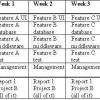People & Teams
Articles
|
Going the Distance: Five Tactics to Compensate for Distance on Distributed Teams Teams communicate quickly and freely when they work in the same room. There's no time wasted walking down the hall, going to another floor, or waiting for a return email or call back. Collocation is the most effective arrangement for teams, but that's not always possible. Esther Derby shares five tactics that help teams compensate for distance. |
||
|
Short Takes on Software Development and Life The Our Take column in StickyMinds.com's StickyLetter presents parallels between the world of software production and the world at large. Here are some previous musings by past editor Pamela Young. |
Pam Young
March 16, 2006 |
|
|
Strengthening Your Speaking Savvy Speaking at a conference can work wonders for your credibility. Delivering a presentation is an opportunity to share your insights, convey valuable information, and gain a reputation as an expert on your topic. Provided you keep a few key points in mind. In this article, Naomi Karten offers suggestions for successful presentations. |
||
|
Do We Have to Choose Between Management and Leadership? Do organizations need fewer managers and more leaders? Do the qualities of one outweigh those of the other? In this article, Esther Derby defines leadership and management, and shows how one test manager incorporates both. |
||
|
How Much Building Is Too Much? Staged integration versus continuous integration—which does your team prefer? Can't decide if one is better than the other? In this column, Johanna Rothman explains that you can create the perfect blend of the two. Developers and testers benefit from frequent builds, but be careful with how much you build. Build too much or too little and a project could topple. |
||
|
Issue Priority and Severity There are several topics that can trigger near religious fervor in software developers--languages, indentation, and comments come immediately to mind. One of Peter Clark's personal favorites is the relationship of issue priority to issue severity in defect tracking systems. Just what the heck do all those levels mean, anyway? In this week's column, Peter describes a solution that his company devised to clearly define the characteristics of severity and priority and help them better understand how the two work together. |
Peter Clark
December 30, 2005 |
|
|
Helping Your Team Weather the Storm Jim is mad at Hal. Sara is complaining to Jason. Hal feels hurt; Susan shows up late. Jason thinks only Sara and he have a clue. Is this team falling apart—or just experiencing a normal part of group development? In this column, Esther Derby describes what their team leader Jenny goes through as she learns about the predictable ups and downs of team formation and the one thing any team member can do to help. |
||
|
Cases Against Applying Schedule Pressure Do you think that by removing deadlines from a project a team will have enough time to create perfect software? Theoretically, it's possible, but in this column Mike Cohn explains that this theory might not hold against ingrained behavior. He recalls how several teams reacted when deadlines were lifted from the projects they were working on. Their only goal: to produce perfect software. But that goal inadvertently brought something to the surface, that old habits die hard. |
||
 |
How Much Work Can You Do—Developing and Managing Your Project Portfolio Knowing how much work your group can accomplish—and how much it takes to complete that work—is critical to your success as a manager. Johanna Rothman explains how to ascertain your team's potential and how to use that information to define and manage your project portfolio so it doesn't manage you. |
|
|
Take Time to Make Time Scheduling a project can become a comedy of errors if you don't remember to plug in all the necessary pieces. In this week's column, Peter Clark takes us to a project kick-off meeting and shows us how to spot several common mistakes people make when creating project schedules. |
Peter Clark
October 6, 2005 |






